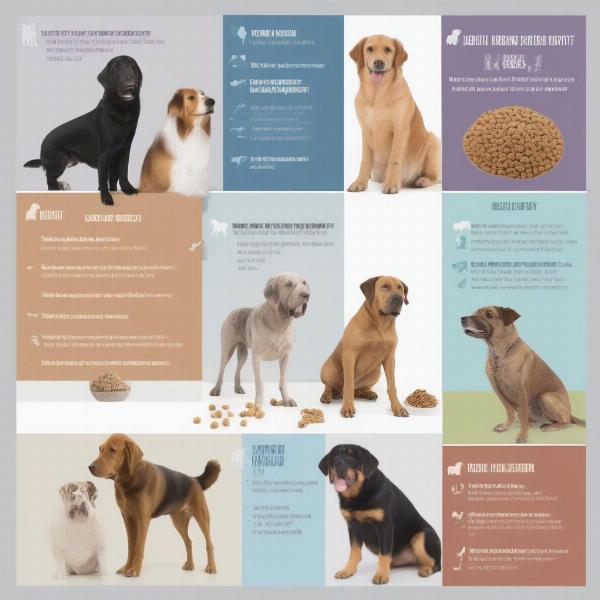Dog tails wagging with joy are often a sign of a happy, healthy dog, and a big part of that happiness comes from proper nutrition. “Dog tails food” is a search term that suggests dog owners are looking for information about food specifically tailored to their furry friend’s needs. This guide dives into the essentials of dog nutrition, from understanding the basics to choosing the right “dog tails food” for your canine companion.
Deciphering Your Dog’s Dietary Needs
Just like humans, dogs have unique nutritional requirements that vary based on breed, age, activity level, and overall health. A tiny Chihuahua won’t have the same needs as a lumbering Great Dane. Similarly, a senior dog needs a different dietary approach compared to a rambunctious puppy. Understanding these differences is the first step towards choosing the best “dog tails food.”
 Dog Breeds and Their Specific Food Needs
Dog Breeds and Their Specific Food Needs
What are the core nutrients essential for a healthy canine diet? Proteins, fats, carbohydrates, vitamins, and minerals form the foundation of any good dog food. Proteins provide the building blocks for muscles, tissues, and organs, while fats are a crucial energy source and contribute to a healthy coat and skin. Carbohydrates offer another source of energy and fiber for digestive health. Vitamins and minerals play a critical role in various bodily functions, supporting everything from bone health to immune system strength.
Choosing the Right Dog Tails Food
With a plethora of dog food brands and formulations on the market, selecting the perfect “dog tails food” can be overwhelming. Start by checking the ingredient list. Look for whole meat sources as the primary ingredients, avoiding fillers and artificial additives. Consider your dog’s specific needs. Does your dog have allergies or sensitivities? reviews on tails dog food provide valuable insights into different brands and their suitability for various needs.
Is your dog a picky eater? Sometimes finding the right “dog tails food” involves a bit of trial and error. Introduce new foods gradually to avoid digestive upset and observe your dog’s response. Does your dog’s tail wag enthusiastically at mealtimes? That’s a good indicator of enjoyment! Remember to consult with your veterinarian for personalized advice. They can help you navigate the options and recommend the most suitable “dog tails food” for your dog’s individual requirements.
Tailored Nutrition for Specific Needs
“Dog tails food” also encompasses specialized diets for dogs with specific health conditions. For example, dogs with allergies might require hypoallergenic food, while those with joint problems might benefit from food rich in glucosamine and chondroitin. If you’re considering a detox for your dog, ensure you consult with a vet beforehand. They can advise on the safest and most effective approach. tails dog food review offers in-depth analyses of various tailored diets.
What are the benefits of personalized dog tails food?
Personalized “dog tails food” allows you to cater to your dog’s specific dietary needs, maximizing their health and well-being. By tailoring their diet, you can address potential health concerns, manage weight, and ensure they get the right balance of nutrients.
Conclusion
Finding the perfect “dog tails food” is a journey of understanding your dog’s individual needs and making informed choices. By prioritizing quality ingredients, considering specific health requirements, and consulting with your vet, you can ensure your dog receives the nutrition they need to thrive. A healthy diet contributes significantly to a happy dog, and a happily wagging tail is the ultimate reward!
FAQ
-
What should I look for in a high-quality dog food? Look for whole meat sources as the primary ingredients, avoiding fillers and artificial additives.
-
How do I transition my dog to a new food? Gradually introduce the new food over several days, mixing it with the old food in increasing proportions.
-
What should I do if my dog has food allergies? Consult your veterinarian for diagnosis and recommendations for a hypoallergenic diet.
-
How often should I feed my dog? Feeding frequency depends on age, breed, and activity level. Consult your vet for guidance.
-
Are homemade dog food diets recommended? While possible, it’s crucial to consult a veterinary nutritionist to ensure the diet is balanced and meets all your dog’s nutritional needs.
-
What are some signs of a food allergy in dogs? Common signs include itchy skin, digestive upset, and ear infections.
-
How do I know if my dog is getting the right nutrition? Regular vet check-ups, a healthy weight, shiny coat, and good energy levels are all indicators of proper nutrition.
ILM Dog is a leading international website dedicated to providing expert advice and resources on dog care and well-being. From detox for dogs to choosing the perfect holiday cottage for your furry friend (whitby holiday cottages dog friendly), we offer a wide range of information to help dog owners make informed decisions. Our team of experts covers various aspects of dog care, including breed selection, health and medical care, training, nutrition, grooming, and much more. If you have any questions or need expert advice on your dog’s health or care, please don’t hesitate to contact us at [email protected] or call us at +44 20-3965-8624. ILM Dog is here to support you and your furry companion on your journey together.